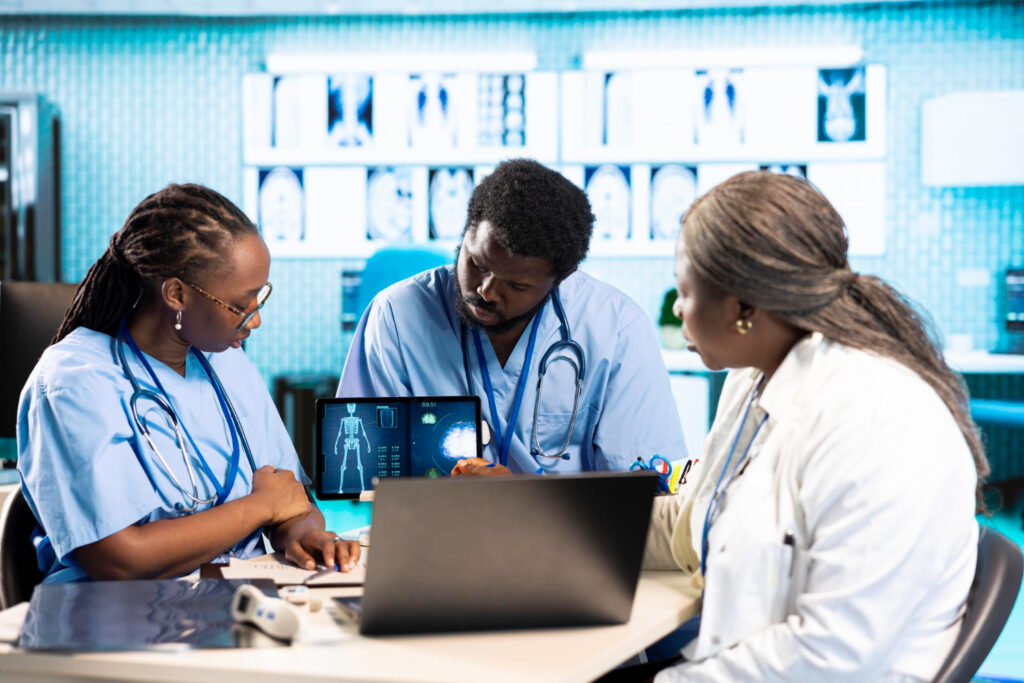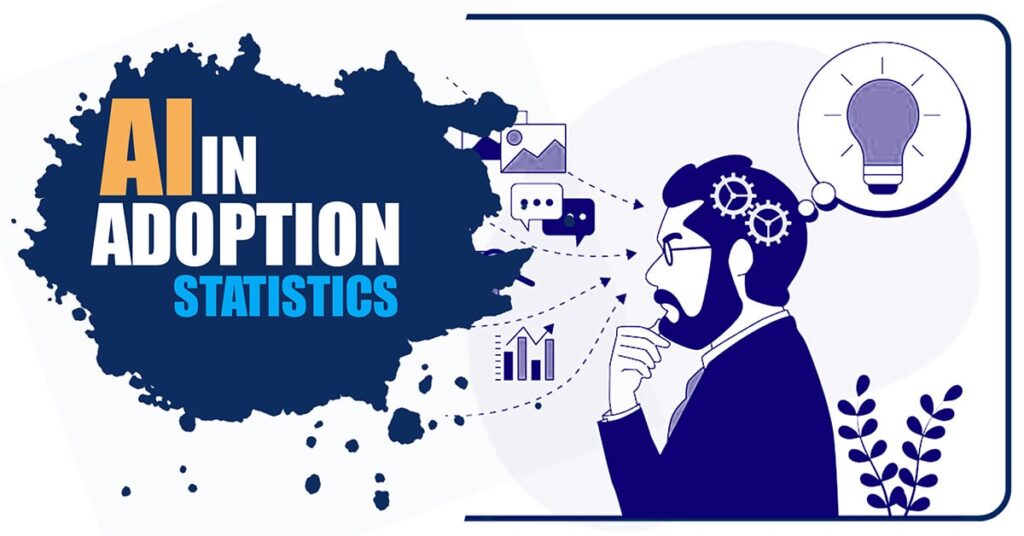Author: Sarah Daniel

Across the African continent, the healthcare system is navigating a critical juncture, confronted by both complex public health challenges and unprecedented digital opportunities. One transformative strategy gaining traction is digital upskilling for health workers. With the continent projected to face a health workforce shortfall of over 6.1 million professionals by 2030, [1] the demand for scalable, tech-enabled solutions to support health delivery has never been more urgent. Digital technologies offer a promising path forward by enabling frontline workers to provide services efficiently, collect and analyse real-time data, and extend care to underserved populations. [5]
“With the continent projected to face a health workforce shortfall of over 6.1 million professionals by 2030, the demand for scalable, tech-enabled solutions to support health delivery has never been more urgent.
Embedding Digital Health into Health Workers Training Curricula
In recent years, research has shown the importance of incorporating digital health competencies into both pre-service and in-service education in Africa. Traditional curricula have lagged behind technological advances. [7] While many African countries recognise digital health’s value, only a select few have systematically included it in their national workforce development strategies. [5] They advocate for structured, competency-based training that equips healthcare professionals with skills to manage mobile health platforms, electronic health records, and artificial intelligence systems.[7] Many African universities are already building capacity and piloting successful structured digital health education models. Some examples of these universities include: Makerere University in Uganda, trained academic staff on a new competency-based, digitally‑enhanced curriculum, with strategic plans through 2030. [15] Redeemer’s University in Nigeria, hosts ACEGID (a genomics center of excellence) offering advanced MSc/PhD training in molecular diagnostics and AI-supported surveillance. [16]
Real-World Initiatives fostering digital health capacity
A tangible example of digital upskilling in action is Amref Health Africa’s LEAP platform, first unveiled in 2016 as an mHealth solution designed to revolutionise how community health workers in Kenya (and later across sub‑Saharan Africa) receive training. [6] LEAP allows health workers to access ongoing training, quizzes, supervision support, and rapid updates via SMS and audio on their mobile devices, enabling them to stay effective in their communities. [2]
Africa Center for Disease Control’s two‑year Public Health Informatics Fellowship sits at the forefront of continental workforce development. Validated in mid‑2024, this program combines 80% practical field placements with 20% structured instruction, aiming to equip fellows with skills in digital health systems, data science, surveillance, and leadership. [10] The curriculum, officially approved during a June 2024 workshop, underscores the fellowship’s ambition to train an elite workforce capable of leading informatics‑driven transformations in national health systems across Africa. [10]
Since its launch in 2019, the Pierre Fabre-sponsored Ghana eHealth Inter-university Diploma across Bamako, Dakar, Abidjan, and Lomé has produced over 160 graduates, with 48 in the 2024 cohort, who are now actively developing digital health solutions (e.g., tele‑GBV tool e‑Djigui) and contributing to local digital health ecosystems. [19]
Microsoft Nigeria, in collaboration with Tech4Dev and Data Science Nigeria, launched a US$1 million initiative to train 1 million Nigerians in AI and cybersecurity over two years. [20] This large-scale program focuses on youth and civil servants, offering certifications and practical training aimed at boosting the digital workforce and integrating AI competencies into public and private health sectors.
The Knowledge Translation Unit, backed by the South Africa Medical Research Council and the Bill & Melinda Gates Foundation, is actively developing AI-Supported Healthcare Assistant (AISHA), a Large Language Model (LLM)-based tool to synthesise and update clinical guidelines for primary care providers in South Africa. The prototype is in continuous improvement phase, with stakeholder testing throughout 2025. [21]
Microsoft South Africa has launched a US$1 million initiative to train 1 million South Africans by 2026 in AI, cybersecurity and digital skills; targeting youth, public servants, and health sector leaders. This builds on the company’s training of 4 million Africans previously, supporting broader digital health transformation. [22]
“Microsoft Nigeria, in collaboration with Tech4Dev and Data Science Nigeria, launched a USD 1 million initiative to train 1 million Nigerians in AI and cybersecurity over two years.”
The Rise of Artificial Intelligence in African Health Systems
Africa’s AI landscape is growing at an exceptional pace, with its market projected to grow from USD 6.9 billion in 2024 to around USD 18 billion by 2030 (a compound annual growth rate of approximately 17.7%), indicating widespread and accelerating adoption across sectors, including health. [12] Even within AI-powered robotics (used in diagnostics, sample handling and patient care), the market is expected to grow at over 25% annually, reaching nearly €685 million by 2030. AI-powered fetal monitoring introduced in a Lilongwe, Malawi, clinic led to an 82% reduction in stillbirths and neonatal deaths, demonstrating AI’s potential to improve maternal and child health outcomes dramatically. [11] In diagnostic radiology, federated learning models across eight African countries have shown promise in building robust, privacy-sensitive AI algorithms for tuberculosis screening. [13] Additionally, startups in Ghana and Rwanda are rolling out AI-driven cancer-detection tools and mobile-based audiometry devices, all leveraging edge computing and smartphone integration. [13] However, rapid growth also brings challenges. African health systems often lack the digital infrastructure, regulatory frameworks, digitally literate workforce and data governance needed for safe and equitable AI deployment. [14] Addressing these gaps will require not just technology investments, but also strategic partnerships, workforce training, and locally adapted ethics and legal frameworks.“Africa’s AI landscape is growing at an exceptional pace, with its market projected to grow from USD 6.9 billion in 2024 to around USD 18 billion by 2030.”

Harnessing Digital Innovation to Strengthen Health Systems in Africa
Digital health solutions played a vital role in Africa’s COVID-19 response and are now shaping broader health system resilience. During the pandemic, several African countries rapidly deployed digital tools such as contact tracing apps, symptom self-checkers, and data dashboards to monitor spread and coordinate public health actions.[4] Although the adoption of digital health tools is growing across Africa, many technologies operate in isolation from government-led systems, resulting in fragmented service delivery and limited integration into national health responses.[5] These technological tools filled critical gaps in surveillance, data sharing, and remote health delivery, especially in contexts where traditional health infrastructure was limited.[4]
Beyond the immediate pandemic response, digital health has potential to address long-standing systemic issues such as workforce shortages, inconsistent data systems, and inequitable access to care.[5] There is a crucial need for sustained investment in digital health infrastructure, regulatory frameworks, and workforce upskilling to avoid reverting to pre-pandemic fragmentation.[8]
Barriers to Scale and Sustainability
Despite the progress made, several structural challenges continue to limit the widespread adoption of digital tools. Issues such as limited internet connectivity, unstable electricity supply, lack of digital literacy, community acceptance, political goodwill and the high costs of hardware persist, particularly in rural and conflict-affected areas.[9],[5] Furthermore, many digital health training programs remain donor-funded and are not yet embedded into national systems, making their long-term sustainability uncertain.[8]
To overcome these barriers, several researchers and policy advocates emphasise the need for coherent digital health strategies. It is imperative to harmonise regional approaches to digital health education, African governments and partners need to leverage multilateral support from entities like the African Union and WHO-AFRO.[8] They argue for integrating digital skills into national licensure systems and developing formal policies to support continuous professional development in digital competencies .[8]
The Role of Youth in Leading Health Innovation
Youth have a critical role in driving this transformation not only because of their skills, but also due to their numbers; Africa is home to the world’s youngest population, with over 60% under the age of 25.[17] This demographic advantage positions young people as a powerful force for change. Particularly, those trained in both public health and digital technology are leading innovation through community-based initiatives, hackathons, and digital health startups. As digital natives, they possess the creativity, adaptability and technical fluency needed to design culturally relevant and user-centered health solutions. [3]
“Africa is home to the world’s youngest population, with over 60% under the age of 25.”
Conclusion
Digital upskilling presents a transformative pathway for strengthening Africa’s health systems amid urgent workforce shortages. Practical initiatives are already in place to equip health workers with essential digital competencies and expanding access to quality care. AI-driven solutions, supported by academic institutions and private sector efforts, as well as universities in Africa that are already piloting successful structured digital health education models, further demonstrate Africa’s growing capacity for digital health innovation.
However, sustainable impact will depend on bridging infrastructure gaps, embedding digital training into national strategies, schools and health workers training curriculum, and aligning efforts across sectors. With its youthful, tech-savvy population, Africa is uniquely positioned to lead a people-centered, digitally empowered health revolution if momentum is matched with long-term investment and policy commitment.
References
- World Health Organization. Chronic staff shortfalls stifle Africa’s health systems: WHO study. (2022). https://www.afro.who.int/news/chronic-staff-shortfalls-stifle-africas-health-systems-who-study
- Amref Health Africa Enterprises. (n.d.). Leap, the mHealth platform. https://amref.org/enterprises/our-products/leap/?utm
- DHealth Africa. (2022). Leading innovation for public health in Africa: The role of young people. https://medium.com/@dhealthafrica
- Tobias F Rinke De Wit, Wendy Janssens., (2022). Digital Health Innovation in Africa: Implications for COVID-19 Response and Beyond. Frontiers media SA. https://www.ncbi.nlm.nih.gov/pmc/articles/PMC10012758/
- Ayomide Owoyemi, Joanne I Osuchukwu., et al. (2022). Digital Solutions for Community and Primary Health Workers: Lessons From Implementations in Africa. Frontiers Media SA. (2022) https://www.ncbi.nlm.nih.gov/pmc/articles/PMC9215204/
- Amref Health Africa. Amref Health Africa unveils revolutionary mobile solution for training community health workers. (2017). Newsroom https://newsroom.amref.org/news/2017/02/amref-health-africa-unveils-revolutionary-mobile-solution-for-training-community-health-workers/?utm
- Derrick M, Andrew A, Egwar J. N. Towards a digital health curriculum for health workforce for the African Region. (2019). Researchgate. https://www.researchgate.net/publication/340203714
- Elizabeth Bakibinga-Gasawaga et al., Digital technologies in the COVID-19 responses in sub-Saharan Africa: policies, problems and promises. Pan African Medical Journal. (2020). https://www.panafrican-med-journal.com/content/series/35/2/38/full/?utm
- Bill-Erich N.M., Valirie A.N. et al., Factors associated with the use of digital health among healthcare workers in the Buea and Tiko Health districts of Cameroon: A case-study. Pan African Medical Journal. (2023). https://www.panafrican-med-journal.com/content/article/47/51/full/
- Africa CDC. Africa CDC validates new Public Health Informatics Fellowship curriculum. (2024). https://africacdc.org/news-item/africa-cdc-validates-new-public-health-informatics-fellowship-curriculum/?utm
- How AI monitoring is cutting stillbirth and neonatal deaths in a clinic in Malawi. The Guardian. (2024). https://www.theguardian.com/global-development/2024/dec/06/how-ai-monitoring-is-cutting-stillbirths-and-neonatal-deaths-in-a-clinic-in-malawi?utm
- Khris, S. 85 Insane AI adopted Statistics in 2025. Khrisdigital. 2025. https://khrisdigital.com/ai-adoption-statistics/?utm
- Artificial Intelligence. Health Tech Africa. 2025. https://healthtechafrica.org/technology/artificial-intelligence?utm
- Beverly A. T. et al., Mapping the regulatory landscape of AI in healthcare in Africa. Frontiers in Pharmacology. 2023. https://pmc.ncbi.nlm.nih.gov/articles/PMC10484713/?utm
- Mak Editor. Directorate of Graduate Training Rolls out Research Management Information Sytems (RIMS). Mak News. 2025. https://news.mak.ac.ug/2025/06/directorate-of-graduate-training-rolls-out-research-management-information-sytems-rims/
- Wikipedia. African Centre of Excellence for Genomics of Infectious Diseases. 2025. https://en.wikipedia.org/wiki/African_Centre_of_Excellence_for_Genomics_of_Infectious_Diseases?utm
- Felix Kariba. The Burgeoning Africa Youth Population: Potential or Challenge? Cities Alliance. 2020. https://www.citiesalliance.org/newsroom/news/cities-alliance-news/%C2%A0burgeoning-africa-youth-population-potential-or-challenge%C2%A0?utm
- eHealth Africa Academy graduates 6th cohorts, empowering the next generation of Tech Leaders. eHealth Africa. 2025. https://www.ehealthafrica.org/ehealth-africa-academy-graduates-cohort-empowering-next-generation-tech-leaders/?utm
- Training digital healthcare professionals in Africa: 6th class of graduates for the eHealth inter-university diploma. Foundation Pierre Fabre. 2024. https://www.fondationpierrefabre.org/en/current-initiatives/training-digital-healthcare-professionals-in-africa-6th-class-of-graduates-for-the-ehealth-inter-university-diploma/?utm
- Microsoft to Train 1 Million Nigerians in AI to Boost Digital Workforce. Empower Africa. 2025. https://empowerafrica.com/microsoft-to-train-1-million-nigerians-in-ai-to-boost-digital-workforce/?utm
- Knowledge translation Unit. 2025. https://knowledgetranslation.co.za/digital-innovation/?utm
- Nqobile D. Microsoft to train 1 million South Africans on AI skills. Reuters. 2025. https://www.reuters.com/technology/artificial-intelligence/microsoft-train-1-million-south-africans-ai-skills-2025-01-23/?utm


